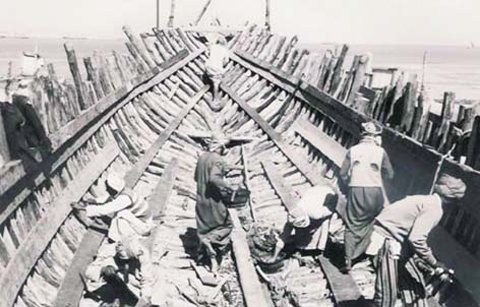 KUWAIT: Many Kuwaitis look at the sea with fondness in their heart especially with the fact that this country used to survive on what the vast ocean had to offer prior to the discovery of oil. Back in the day, Kuwaitis used to venture into the sea to earn a living, sailing on small and large wooden ships made by craftsmen who usually went by the title 'qalalifs'.
KUWAIT: Many Kuwaitis look at the sea with fondness in their heart especially with the fact that this country used to survive on what the vast ocean had to offer prior to the discovery of oil. Back in the day, Kuwaitis used to venture into the sea to earn a living, sailing on small and large wooden ships made by craftsmen who usually went by the title 'qalalifs'.
In the mid-1700s, Kuwaiti-crafted ship earned regional and international praise with states, of what is known now as the GCC countries, commissioning ships to be built for various purposes.
European travelers, who visit the region at that time also showed appreciation to Kuwaiti crafted ships with the most famous praise coming from Lieutenant Colonel Harold Richard Patrick Dickson, a British colonial administrator, who in 1912 claimed that Kuwait "made the finest wooden ship vessels in the region." At that specific year also, some 812 ships sailed from Kuwait. In 1919, the number of ships increased to 1,200, a number reflecting Kuwait's strong sailing heritage.
The process of building ships usually involved a master (Qalaf) who had a number of qalalifs under him. Usually commissioned by merchants and famous skippers, the qalalifs made it their mission to construct the ships no matter how long or hard the tasks were.
The process of constructing a vessel varies with the bigger ships, used in pearl diving, trade, and goods' transportation expeditions, obviously taking longer periods to make depending on the number of construction crew and available materials. Small and medium size vessels were also made for leisure, fishing, and nearby pearl diving ventures.
The popularity of the wooden ship industry continued to grow; however, it dwindled by the 1920s due to a number of geopolitical and economic factors. By the end of World War II and the discovery of oil in 1950, the Kuwaiti wooden ship business continued to fade with 50 vessels operating by that time. Nowadays, a fewer wooden ships still exist to serve as a reminder of Kuwait's old heritage and tradition. - Kuna
By Sarah Al-Mkhaizeem







